"The song of Tzyprianos" and "The kioulsapa"
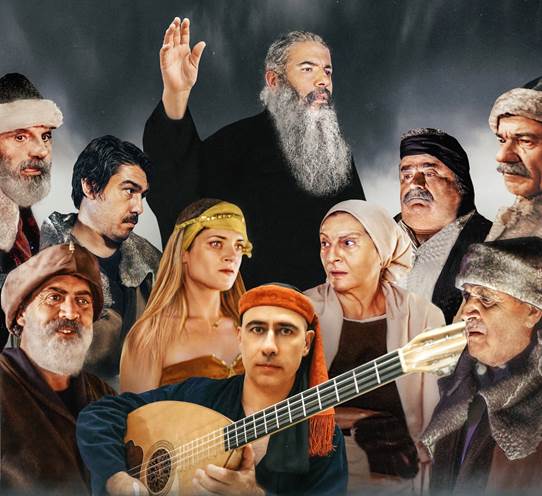
In 2021, on the occasion of the 200th anniversary of the Greek Revolution of 1821, Larkos Larkou presented his compositions as a musical-theatrical-cinematic performance with his settings of the entire poems of Vassilis Michaelides "The 9th of July 1821 in Nicosia (Cyprus)" and "The Chiotissa in Limassol during 1821". with the title 1821 in Cyprus - "The song of Tzyprianos and the kioulsapa".
"The song of Tzyprianos" is the way its author, Vassilis Michaelides, used to call the poem "The 9th of July 1821 (in Nicosia, Cyprus)".
"The kioulsapa" is the most common popular title of the poem published as "The Chiotissa (in Limassol in 1821)", which was untitled by the poet. The dative is an intervention by scholars of the time to title the two emblematic poems at the time of their publication. There is also the contradiction here of the title in relation to the content in terms of discourse; Greek in the title and idiomatic Cypriot dialect in the content.
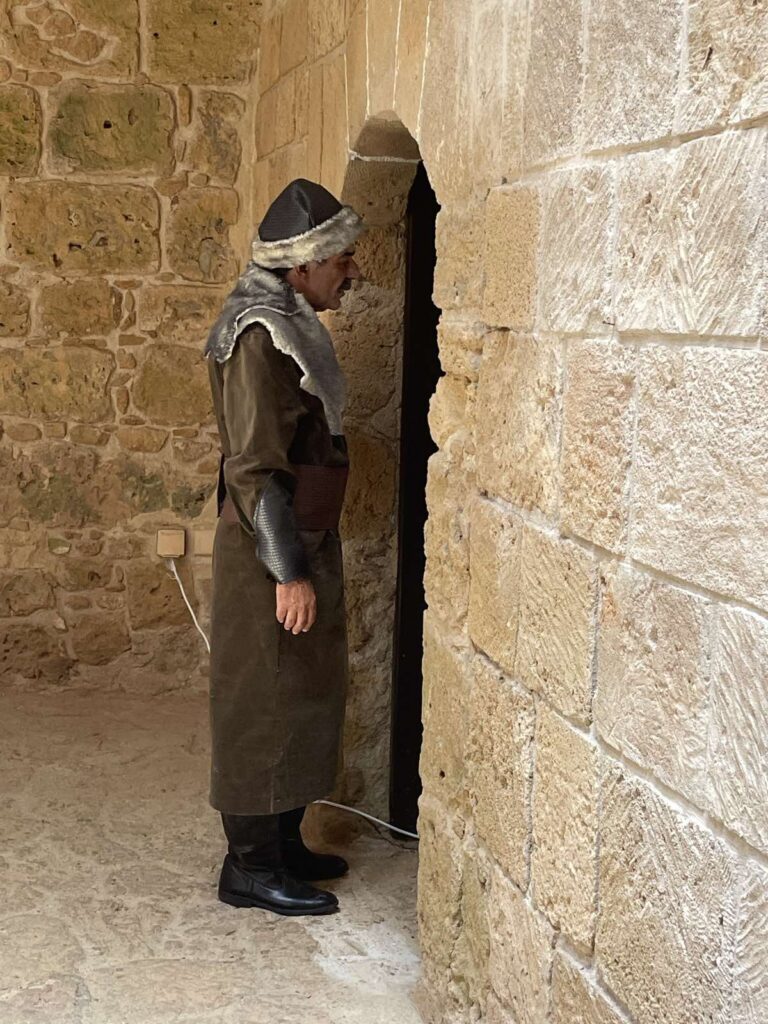
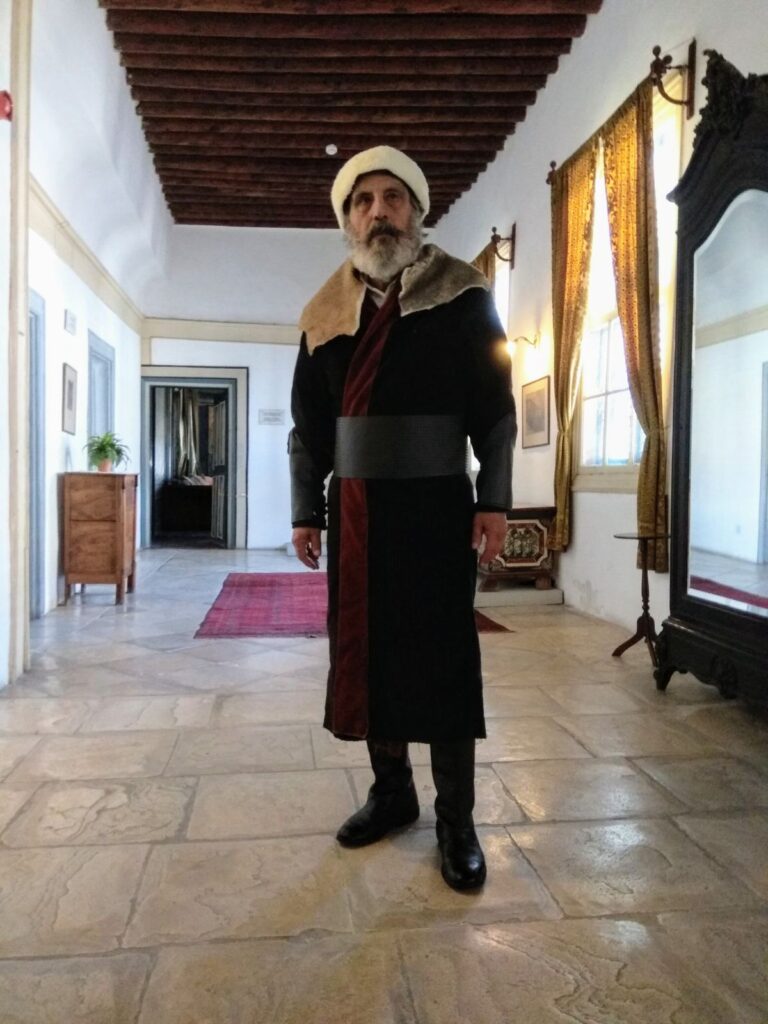

The project and its creation
In this production, I used all my experience as a composer of music for theatre, dance, but also as a performer with voice, instruments and movement. I took advantage of this accumulated experience to give final form to the dramatized poems "The 9th of July" and "The Chiotissa", which occasionally occupied me in live performances and in the publication of the CD-book "The first kingdom here was built by the gods", with my multifarious settings of the poetry of Vassilis Michaelides.
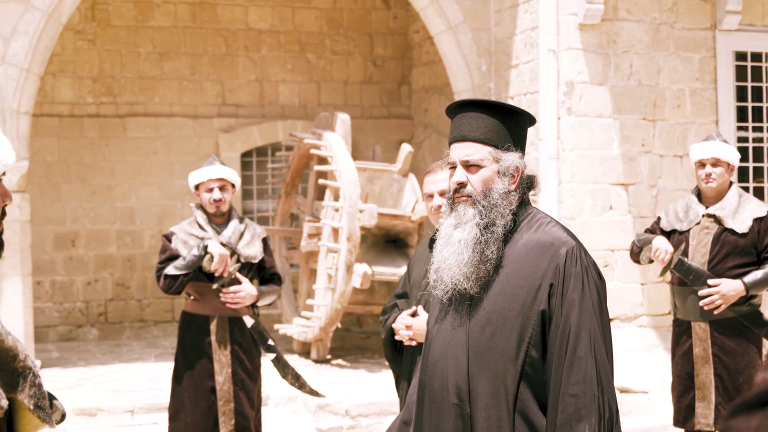
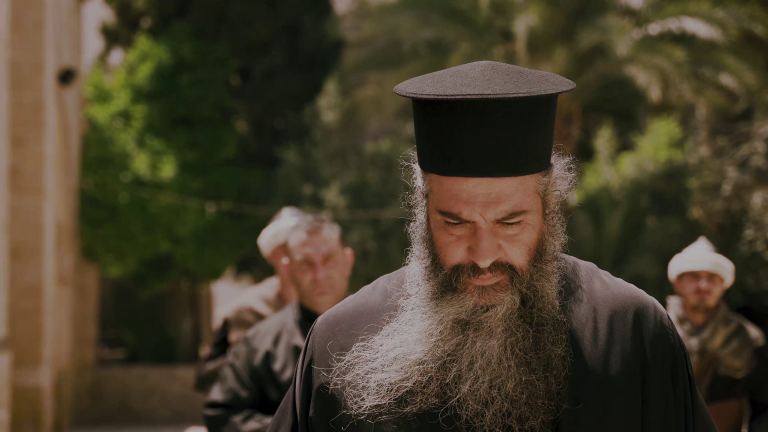
The 9th of July and the lament of the Virgin Mary - the philosophy of musical composition
I always had the impression that no one discovered music on the "9th of July". Perhaps the most valid way would be to listen to the same poet recite it and "steal" the tones and rhythms of his voice!
In "9th of July..." I always had the feeling that the excellence of the speech, this genius meeting of scholarly spirit and popular idiom, exceeds even the meaning. For Vassilis Michaelides was not a folk poet like, for example, Liasidis, nor a scholar like, for example, Lipertis. He was both equally, a layman and a scholar.
I kept strictly to the word, the stanza, the syllable, with a monotony that is creative, shaped and recreated and that, as a repetition, submits. Like "the lament of Virgin Mary (PAnagia)" sung on Maundy Thursday in churches. A Panagia that is consolingly pervasive in the poem, with Kyprianos (Cyprus Archbishop) focusing on her in his prayer, his aspirations for the salvation of the nation and his soul.
My favourite variation on this traditional chant is the one I heard from Kyriakou Pelagia. This one touched me. It's a twisty, repetitive melody traditional song, sung for almost an hour in church. It is the only song that blends with the hymns in liturgical, church time.
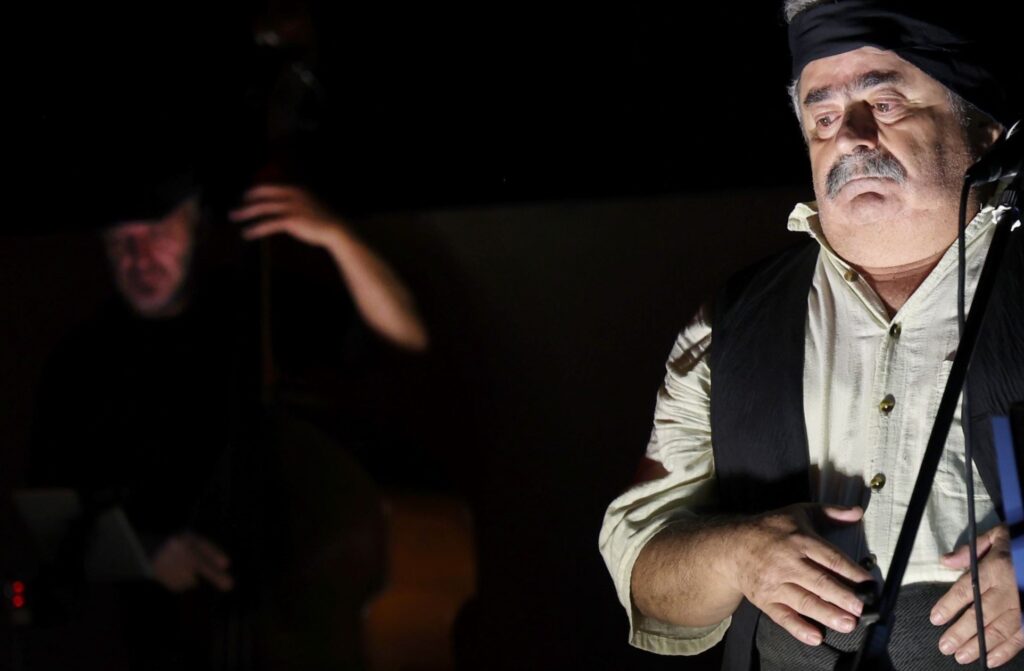
"Behold a dark doom and a sad day
that came to me today of the very bitter
they have caught my son and I am poisoned
and you weep, O heaven and darkened earth."
The power of repetition
I relied from the beginning on the power of repetition. It is a challenge for me to support long texts and poems in a musical way. As in the case of "Chiotissa", which has a duration of 7.5 minutes as a song and 25 minutes or more as a musical event, with the same music played repeatedly, but also, thankfully, not tiring! I do the same in my work on Dimitris Lippertis, where I have 64 long songs to present; poems, whole set to music, without cuts!
In the case of "9th of July" monotony is a fact. It would be funny, if not petty, to mangle it to construct easily digestible folk chants, with selected rhymes. In the case of poetry set to music, I believe that the music should serve the word and nothing else.
A delicate balance of separation between prose and poetry exists mainly when the stride is made, i.e. the completion of the meaning in the next verse, usually. It is all done consciously by the performers in order to keep strictly to the structure of the poem, which, as I said before, is firm and firmly grounded. Any cut-offs without holding the structure of the verse and stanza are pure failure and even sacrilege.
Everything I did from the beginning in the set poetry of Vassilis Michaelides and the unpublished poetry of Dimitris Lippertis, I did with the literary guidance of the most renowned scholars. I was fortunate to meet the academic Dr. Kyriakos Ioannou, who has written a thorough doctoral thesis on "9th of July" and is involved in the life and work of Vassilis Michaelides in general.
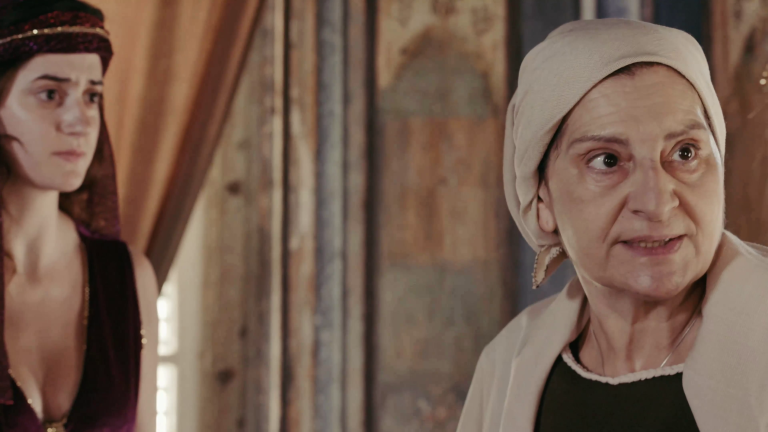
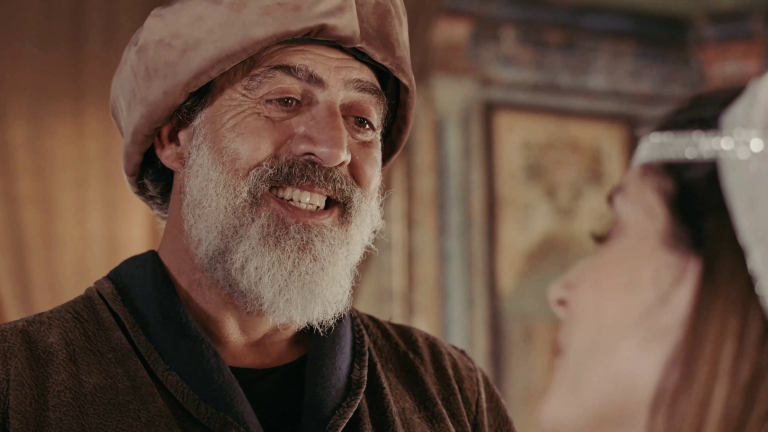

"The kioulsapa" - Form and content of the poem and musical compositional treatment
"The kioulsapa" "The despots" and "the hatzialas" (turkish army chief) are the titles given by traditional women of everyday, mainly, to a scholarly poem that penetrated the popular soul for its meaning, a poem which from the poet's point of view was untitled and its scholarly "correctors" gave it the title "The Chiotissa (in Limassol during 1821)". The Chiotissa (means the woman from Chios island), which is actually two Chios women in the poem, Eleni and Anna.
When "The Chiotissa" was first published in 2010, women contacted me and told me about their "hatzialas" and their "kioulsapa"... then I discovered many testimonies, slowly building up a large archive...
The roles and the interpretations
The performers give a recital of the Cypriot dialect and especially the poetry of the outstanding Vassilis Michaelides, after a detailed analysis and dedication of many hours for this purpose. Flawless performance of the speech by the masters of the word, who I was fortunate to be honoured with their collaboration, such as Andreas Melekkis, Neophytos Neophytou, Michalis Terlikkas, young Andrea Demetriou and all the other dedicated performers, who gave their all in their interpretations, aware of their responsibility as the guardians of cultural heritage and the preservation and rational dissemination of a dialect that is spoken by less than a million people in the world and which in these poems is at the peak of its creative expression and writing.
General information about the performance
The music is performed live and the roles alternate between live and visual. The actors Neophytos Neophytou, Andreas Melekkis, Andreas Nicolaides, Koullis Nicolaou and Ioanna Papamichalopoulou appear in visual form, supported by many extra artists, ethnic guards, dancers and others.
The messages of the work are timeless and universal. It has national, ecclesiastical, historical, pedagogical, literary and musical value.

"In this game of personas, the roles are assumed by personalities in the capacity of priest, actor, traditional singer, philologist, musician, visual artist, but also other institutional guardians of cultural heritage - each with their own approach to the verbal and/or musical interpretation of the text, in its interpretation, sometimes in terms of the art of acting, sometimes with the stoicism of biblical reading and chanting penetration, sometimes with literary didacticism, sometimes with the primary enthusiasm of the amateur... And I together, as a tuner and, shall we say, "echologist", weaving, intuitively, flavours, textures and aromas for this word of sound and for the sound of the word. I have drawn together all the experience of the past to tune the needs of the present with the promises of the future. For here, from time immemorial, everything has its word, and especially that - the word - which is first served, "transcended for all eternity". (Larkos Larkou, September 2021).
The iconic performances of 2021
1st October 2021, Limassol Municipal Garden Theatre "Marios Tokas" (premiere). Organized by the Metropolis of Limassol with the support of the Limassol Municipality
8th October 2021 "Hall of Ceremonies" of the Cultural Foundation of the Holy Monastery of Kykkos in Archangelos, Nicosia - Live broadcast by RIK2.
Also: cultural evenings of Aradippou Municipality, 8 July 2021 (avant premiere).
Creative team:
Composition/orchestration/dramatization: Larkos Larkou
Direction/song teaching: Atys
Philological supervision: Dr. Kyriakos Ioannou
Costume design/construction: Hatice Ardost
Video design: Larkos Larkou
Produced by: Athanasia Larkou
Casting (live):
Larkos Larkou – narrator
Prot. Nikolaos Lymbouridis – Archbishop Kyprianos
Mihalis Hatzimihail – Musellim agas
Mihalis Tterlikkas – shepherd Dimitris
Yianna Lefkatis – rka (Hatzimaria)
Andrea Dimitriou – Xiotissa Eleni (kiulsapa)
Performers (filmed):
Actors:
Neofytos Neophytou – Kioroglou
Andreas Melekkis – officer
Andreas Nicolaidis – son of Kioroglou
Koulis Nikolaou – Ali Beys
Ioanna Papamihalopoulou – Chiotissa Anna (Aishe)
Cops:
Charalambos Krigou – Karkoglou
Kostas Vasileas – Mettes agas
Marios Patsias – Turkish soldier (leader) Vassilis X''Zacharias – Turkish soldier Giorgos Michael – Turkish soldier Sergios Pittas – Turkish soldier Sarantis Totskas – Turkish soldier Stefanos Siaperas - Turkish soldier Achilleas Limistiras - Kyprian's companion (cantor) Panagiotis Liakas - Kyprian's companion (cantor)
Chris Foinikarides - Metropolitan Lavrentios
Christos Foukaras - Metropolitan Meletios
Nikos Larkos - Metropolitan Chrysanthos
Stavriana Koulloupa, Elena Mikellidou, Georgia Christou: harem
Musicians:
Mihalis Messios: double bass
Aggelos Michaeloudis: percussion
Andreas Ioannou: canon
Larkos Larkou: lute
Agathangelos Simantiris: lyre
Panagiotis Tsappis: new
